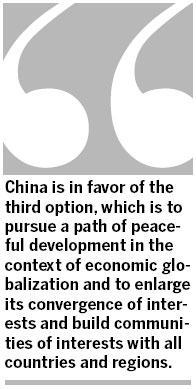Convergence of interests
Updated: 2013-04-01 07:48
By Zheng Bijian (China Daily)
|
||||||||

Trends of the times mean countries should work together to promote cooperation and manage competition
The next decade will be a period of unprecedented opportunities and challenges, both for China and the world. The trends of multi-polarity and economic globalization mean there will be more cooperation and competition among countries. Countries will need to promote cooperation and manage competition.
China's development faces a number of serious challenges in the next decade, such as a shortage of natural resources and environmental constraints on its economic growth; unbalanced economic and social development, including imbalances between investment and consumption and between foreign investments in China and Chinese investments abroad, between urban and rural areas, and between the eastern and western regions; difficult industrial restructuring and insufficient research and development; human resources unable to meet the needs of the employment structure; lagging social governance and increasing social tensions; and natural disasters, both predictable and unpredictable.
To meet these challenges, China must first of all make significant advances in its science, technology and education. Second, China must rebalance the Chinese economy and transform the industrial structure, expanding domestic demand and market demand. Third, China must make great efforts to improve social governance so as to make society more dynamic, orderly, environmentally friendly and therefore more harmonious. Fourth, China should devote more efforts to raising ethical standards and inspiring people to work hard to make the country dynamic, harmonious and stable. And in foreign relations, it must gradually enlarge its convergence of interests with other countries.
China should gradually extend its convergence of interests with its neighbors and surrounding regions and form close-knit communities of interests with various countries and regions in different fields and at different levels.
The peaceful rise of large developing countries is now gaining momentum and the next 10 years will be a crucial period for their development and rise. The international financial crisis has led to a major change in the global structure of productive forces and a new technological and industrial revolution, which is green, low carbon and sustainable, is gaining headway. In the post-financial crisis era, global issues such as climate change, energy security, resources, food security and financial security are becoming more acute and the issue of global governance requires urgent attention. As a result, the economic development patterns of major countries will change significantly, and this will lead to further adjustment in the position of major countries and the relations between their interests.
Turbulence and geopolitical conflicts of various forms still exist, but China should neither panic nor ignore them. Notwithstanding the changes in the global landscape, international relations will still be determined by sovereign states for the foreseeable future. Respecting sovereign rights and territorial integrity are still indispensable and basic principles of international relations.
International relations are complex and many different factors are at play. However, major countries have only three options before them. The first is to adopt a Cold War mentality and to engage in Cold War strategies. The second is to engage in local hot wars as another world war is not possible. The third is to build communities of interests for common development. History has shown us that the first two options should be rejected.
As globalization deepens, countries around the world are facing common and completely new challenges. It would be dangerous if any country responded to these global challenges in the first half of 21st century with the old mindset and old strategies employed before 1970s.
China is in favor of the third option, which is to pursue a path of peaceful development in the context of economic globalization and to enlarge its convergence of interests and build communities of interests with all countries and regions.
In short, our goal is to integrate the interests of the Chinese people with the common interests of the rest of the world, expand the convergence of interests with other countries and build communities of interests with other countries, so China and the rest of the world can realize peaceful development.
The author is a former vice-president of the Party School and director of the China Institute for Innovation and Development Strategy. This article is based on his keynote speech at the Fifth World Forum of China Studies on May 23 in Shanghai.
(China Daily 04/01/2013 page8)

 In Photos: 7.0-magnitude quake hits Sichuan
In Photos: 7.0-magnitude quake hits Sichuan
 Li Na on Time cover, makes influential 100 list
Li Na on Time cover, makes influential 100 list
 FBI releases photos of 2 Boston bombings suspects
FBI releases photos of 2 Boston bombings suspects
 World's wackiest hairstyles
World's wackiest hairstyles
 Sandstorms strike Northwest China
Sandstorms strike Northwest China
 Never-seen photos of Madonna on display
Never-seen photos of Madonna on display
 H7N9 outbreak linked to waterfowl migration
H7N9 outbreak linked to waterfowl migration
 Dozens feared dead in Texas plant blast
Dozens feared dead in Texas plant blast
Most Viewed
Editor's Picks

|

|

|

|

|

|
Today's Top News
Live report: 7.0-magnitude quake hits Sichuan, heavy casualties feared
Boston suspect cornered on boat
Cross-talk artist helps to spread the word
'Green' awareness levels drop in Beijing
Palace Museum spruces up
First couple on Time's list of most influential
H7N9 flu transmission studied
Trading channels 'need to broaden'
US Weekly

|

|







